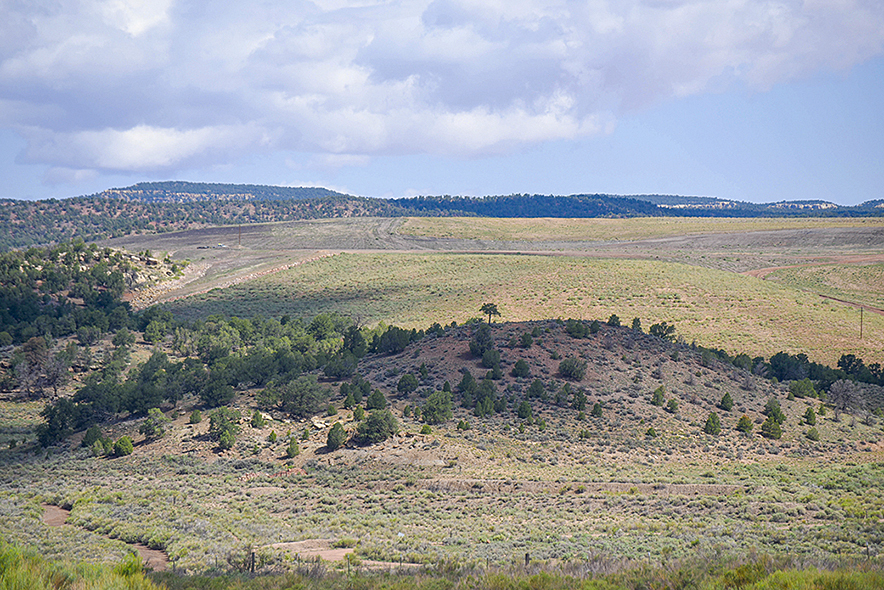
FERC rejects hydro project permits amid opposition: Part I

Navajo Times | Krista Allen
The Kayenta Mine Complex sits idle after closing on Aug. 26, 2019, in this August 2021 photo.
WINDOW ROCK – Federal officials rejected three water pump storage projects in Black Mesa, including several other pump storage projects in the Navajo Nation.
The Federal Energy Regulatory Commission, or FERC, rejected preliminary permit applications to Nature and People First Arizona PHS Inc. (developers) regarding the Black Mesa Pumped Storage Project on Feb. 15.
The Black Mesa Pumped Storage Project was proposed in 2022 to build three water storages on the north, east, and south of Black Mesa.
Because of FERC’s new policy to not issue preliminary permits for projects on tribal lands without the tribe’s consent, FERC rejected the Nature and People First Arizona.
Additionally, the Navajo Nation had explicitly opposed the project to intervene. Therefore, FERC denied the preliminary permits to Nature and People First Arizona.
A turning of a new direction for FERC, as in previous years, the commission issued permits without tribes’ consent about proposed projects on tribal lands.
According to Rachel Ellis, the associate director for the Southwest River Protection Program with American Rivers, dealing with hydropower permits and licenses, there are two stages.
If issued, the sole purpose of a preliminary permit is to grant the permit holder priority to file a license application during the permit term. This could be a 50-year license, Ellis said.
However, the preliminary permit does not authorize the holder to perform any land-disturbing activities or enter upon lands or waters others own without the owner’s express permission.
If a preliminary permit is accepted, the developer(s) would receive three years to gather data and produce studies to see how feasible the project is, said Ellis.
The Nation opposed previously proposed projects regarding the Little Colorado River. FERC officials said “no” and that preliminary permits are acceptable. They would receive a consultation with the tribes at a later stage in the process, said Ellis.
However, with FERC’s new policy of mandatory consent from tribes and tribal land where a proposed project would take place, FERC would need the tribe’s permission to permit developers.
Additionally, Ellis said FERC does not necessarily define the new policy. However, it will still be upheld to standards and “binding” and will be spelled out for tribal consultation and consent.
Black Mesa Pumped Storage Project
All three projects would use roughly 450,000 acre-feet of Diné water to generate electricity exported to cities hundreds of miles away.
This includes Black Mesa groundwater and the Colorado River and San Juan River; nine reservoirs on/near Black Mesa totaling 35,720 acres, 8,000 acre-feet of water is required each year after project completion, according to Diné nonprofit organization Tó Nizhóní Ání.
That is roughly 126 trillion gallons of over two million 55-gallon water barrels. A hundred times Wheatfields Lake.
This caused a concern that the project would impact the use of tribal lands by the Navajo Nation and communities.
The Navajo Nation Department of Justice filed a motion to intervene. It stated this project may impact the Nation’s water rights or the use of waters of the Colorado River and San Juan River systems, as well as two unnamed aquifers and their sources.
According to DOJ’s motion, the applicant (Nature and People First) did not seek consent from the Nation or procure the required clearances and permits for preliminary biological investigations or construction of the project.
According to FERC’s ruling, the applicants should work closely with tribal stakeholders before filling out applications to ensure that tribes are fully informed about the proposed projects on their lands.
This would allow the tribes to consider the project development. However, Nature and People First did not consult with the Navajo Nation, where the projects are sited entirely.
Given this project’s severe impacts, the Nation and its communities are protecting water sources.
FERC hydro project permits is a series. Read Part II in the Feb. 22, 2024, edition of the Navajo Times.







 Highway 264,
Highway 264, I-40, WB @ Winslow
I-40, WB @ Winslow